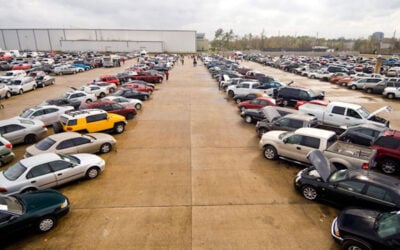Car-buying myths seem to be just as common as urban legends. Nobody knows how these myths get started. We’re willing to bet they get started when someone misunderstands the terms of a deal or when they misunderstand car buying in general. First-time car buyers can start their experience off right when they don’t let these common myths get in your way!
We’ve gathered five common car-buying myths that you may have heard at some point in your life. We’ll take a look at each myth and pull it apart to find out why it’s incorrect. Let’s get started.
Myth #5: Buying a Car in the Rain
For some reason, buying a car in the rain has become a rock-solid piece of car-buying advice for some people. Every first-time car buyer beware: The rain has no impact on car sales! This idea is based entirely on the belief that car dealerships will be slow on rainy days, so they’ll be desperate for sales.
In truth, this myth has been around for so long that some car dealerships have reported being busy on rainy days. Let’s put this myth to rest and stop flocking to car dealerships when it rains.
Myth #4: Buying Cash Will Get the Best Price
We’ve all heard that “cash is king,” and while that’s true in some areas, car buying is not one of them. This myth implies that you’ll receive a better price if you walk with a briefcase full of $100 bills and offer to buy your dream car using cash.
It might seem like a car salesperson would be all over that, but in actuality, you may get a worse deal than the next customer who is financing their purchase.
When you finance a car, the car dealership is able to bake in some profit into your loan. Financing is one of a dealership’s main profit streams. As such, dealerships are more motivated to make a deal with someone who is going to finance their car than someone who is going to pay in cash.
Learn the dealer lingo. Check out our F&I office glossary of terms.
If you want to pay for a car using cash, finance it at the dealership and make sure there is no prepayment penalty. Then, pay it off in full a few weeks later. It’ll work in the same way as it would if you had bought the car with cash, but you’ll receive a better deal.
Myth #3: Buy Now or the Deal Will Disappear
One of the main pieces of car-buying advice that we always tell first-time car buyers is to walk away if you don’t feel comfortable with a deal. As strange as it may seem, buyers can get stuck in the mentality that walking away means they’ll lose out on the car. That’s why this car-buying myth has been around for so long!
Yes, walking away from a deal will mean that you won’t get that specific deal. But next week or next month, chances are that you can get an extremely similar deal. That’s why we always recommend talking to multiple car dealerships.
The only exception to this myth comes when you’re after a limited make and model. If there’s a chance that the dealerships will run out of the car you’re after, then this myth may actually be true for you.
[good spot for the MPR widget]
Myth #2: Buying Used Will Save You Money
One of the most popular car-buying myths is that used cars are the best way to buy. The idea comes from the fact that the value of the car has already depreciated, so you’ll be buying a car that’s closer to its true value.
While there is some truth here, you shouldn’t rule out buying a new car in total. You also need to consider the cost of maintenance and upkeep that comes with a used car.
Most importantly, you’ll have far more lending options if you go for a new car. Because dealers are incentivized to reduce the time on the lot for new cars, they may be more willing to negotiate on the price of a new vehicle.
Myth #1: I Don’t Know Enough to Negotiate
Some first-time car buyers think that negotiation is a matter of knowing specific key phrases that will turn the tide in their favor. While knowing what to say and when to say it does help, knowing the value of the car that you’re buying and being confident and firm is actually the thing that is the most important.
There’s no knowledge threshold to keep you from being a skilled negotiator. Use our member solutions to determine how much you should be paying for a new or used car and confidently remain within the realms of the deal that you’d like to land.
Unraveling common car-buying myths can help you to win in negotiations. While some of the myths have nuggets of truth in them, others are legitimately bad advice. Stick with the sources that you can trust for quality advice about how to score a great deal.








![10 Cars with the Lowest Cost of Ownership [2026 Data]](https://caredge.com/wp-content/uploads/2026/02/2026-Toyota-Corolla-Hatchback-400x250.png)




Depreciation is the biggest cost associated with buying new, usually 30% in the first three years. Unless you are going to buy a car and drive it for 10 years, buying a quality used vehicle. Four years ago we purchased a 2008 Lexus GX470 that my wife drives. We bought it for just under 40% of new, $23K vs. $58K (in 2008 dollars) with 63,000 miles four years ago. It is still worth around 20K in this market with 94K miles. Those vehicles can go for 300,000+, some are at 900,000 miles with proper care and a garage. 250,000 is not unreasonable for the life of that vehicle. The interior goes before the mechanicals or people get bored. I get 75% of the utility for 50% of the price. With good residual value at 250K, it’s more like 30% cost for 75% utility.
Granted it is going to need timing belts, tires, and some suspension work but even with that, the total cost of ownership is far less. Tires, brakes, oil changes and a timing belt at 90K; all done myself (I teach automotive at a high school and I have minions). All costs, depreciation, premium gasoline, insurance, licenses and repairs included, it costs me a total of 66 cents per mile on 8,500 miles per year.
And don’t forget license fees. My 2008 Lexus is $66 a year, a new one is more like $500 per year. Insurance on a $60K rig is a lot more than a $20K greatly depreciated luxury car. I pay about $55/month for full coverage 250/500. For most middle income folks, the financials are the most important yet almost totally overlooked analysis when buying a car. The Total Cost of Ownership is key to selecting a quality yet economical vehicle to purchase.
What is the total cost of ownership for a similar new vehicle? $1.50/mile or more is my guess.
If you are willing to keep a car until it is 20 years old with 250,000 miles on it, why wouldn’t you want to start with new instead of letting someone else enjoy it. Not to mention knowing how it was taken care of from the beginning. There are many used cars that are in bad condition due to neglect and most of us are not mechanics.